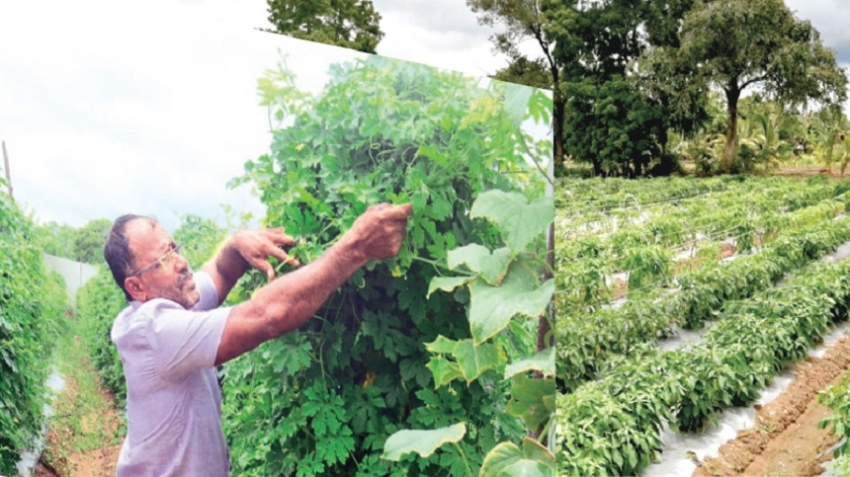There was a time when village youth dreamed of the ‘big city’ as their destination for a good life. But, that was a time of under-development and little business outside the metropolis other than traditional farming and the village kadé. Over 80 percent of rural youth were drifting into the city in search of income avenues.
Today, thanks to gradual development and business dynamism, the trend is reversing – youth are coming back home or, are staying back in the village lured by the business prospects of modern agri-business.
Youth, who left agriculture for better prospects in other sectors are now beginning to return to the age-old occupation that has sustained communities for generations, for centuries - farming. And this is due to the modernisation of Sri Lankan agriculture and the venturing of corporates into the countryside, investing in and engaging with the local producers, point out farmers in Thambuththegama.
Thambuththegama is a thriving rural area brimming with various kinds of agriculture and, now, being further opened up with the latest in agri-business ventures by Cargills, one of the country’s oldest conglomerates and among the most successful. Farmers in the Thambuththegama area, benefitting from the Cargills ‘Sarubima Agriculture Modernisation’ project were quite clear about where they want to be, when the Daily News visited them last week.
“Our children who thought they could earn better and faster in other occupations in Colombo have seen the benefits of modern agricultural practices such as drip irrigation and fertigation adopted by farmers who now make a better living in a productive and cost effective way,” Piyal Kumara, a vegetable farmer in Medagama said.
He said he has been able to double his income and slash the cost of production by half due to the drip irrigation and fertigation system introduced by Cargills (Ceylon) PLC last year.
“I harvested around 4,000 kilogrammes of bitter gourd this time from 700 plants having used around 10 kg of fertiliser and two workers to assist in weeding and harvesting whereas under conventional farming, with the same extent of land, my yield was around 500 kg having to employee around 10 to 15 workers and using more fuel,” Kumara said.
“My son who wanted to start his own venture has decided to take into agriculture having realised how convenient and efficient the new techniques are and the outcome of the system. We are thankful to Cargills for introducing modern agricultural practices such as drip irrigation and fertigation because of which I was able to build a better house and purchase a vehicle to transport the produce,” a farmer in the area said.
The use of nets and new irrigation and fertilisation methods have drastically reduced both pre and post-harvest losses by almost 100 percent. The pre and post-harvest losses are so minimal that most farmers today feel it is negligible. This is the added value in business knowledge that big corporates bring with them.
“I harvested 1,700 kilogrammes of bitter gourd and cucumber and only 40 kilogrammes were rejected at the collection centre, whereas in the past, it was over 200 kilogrammes - thanks to mulch, nets and the effective irrigation and fertilisation methods that has helped not only in keeping pests such as rodents, birds, wild boars, peacocks and cattle away from our farms, but also increasing the yield by several folds and cutting down expenses on fuel, water, fertilisation and the time spent at the farm to weed, irrigate and protect the cultivation from pests,” Sunil Abeysinghe, a farmer from Makulawa said.
Drip irrigation and fertigation were introduced to the Thambuththegama farmers following an ‘exposure visit’ conducted by Cargills last year to India through which our farmers were introduced to modern farming technology adopted by farmers in India.
Drip irrigation is used effectively in Israel and many developed countries for efficient water management and high yield returns. The farming technology under the Cargills Sarubima Agriculture Modernisation project in Thambuththegama has also helped farmers to improve the quality of the produce. Farmers are now able to go beyond shores to the global export market with their Good Agricultural Practices (GAP) certification.
This enables Group Manager, Agri-Business Cargills (Ceylon) PLC, Haridas Fernando to confidently pronounce: “We have around 25 farmers who have obtained GAP certifications and most likely they could start exporting by next year.” He added that the company hopes to train more farmers in the new irrigation and fertigation systems enabling them to produce high-quality yield and crack the export market.
He said Sri Lanka will soon be able to export fresh fruits and vegetables to the European markets once the accreditation for exports under the Good Agricultural Practices (GAP) and Good Handling Practices (GHP) are awarded to local farmers this year.
‘My dream is to be an exporter of quality produce and help other farmers to get on the bandwagon soon rather than wasting time, energy and money on conventional farming which is less productive and lucrative,” Nandana Liyanal Premathilake, an eggplant cultivator in Thambuththegama said.
Premathilake, a father of three with the elder two children attending university, is happy that his younger son is keen to join him and take over someday the occupation which he feels will be a profitable venture under new farming techniques.
“Earlier, I had to hire eight to 10 workers for the application of fertiliser and around 20 to weed during a season, but now I need only one to help in fertilising and three to weed. By this, I have been able to save money and start another plot of cultivation,” Premathilaka said.
Farmers said the use of nets has helped minimise damage to crops by pests.
Plastic mulch is a product used to suppress weeds and conserve water in crop production and landscaping. Mulches also act as a barrier to keep methyl bromide, a powerful fumigant, and ozone depleted in the soil. Crops grow through slits or holes in the thin plastic sheeting. Plastic mulch is often used with drip irrigation. Research has been done using different colours to affect crop growth.
Farmers who have adopted drip irrigation said the application of weedicides has dropped by around 70 percent as a result of GAP which has also helped reduce pre and post-harvest losses to around 20 percent from around 35 to 40 percent.
Famers also said they want to increase the supply under GAP and obtain a better price in the future. They have also seen the interest shown by their children and the youth in the area to take up to agriculture under GAP which has not only made agricultural farming attractive but also lucrative.
Assistant Director Agri-business Development Department of Agriculture A.S.M. Roshan said Sri Lanka standards auditing authorities are making every effort to obtain the international GAP certification in the near future that will enable the country to export to the European Union, Middle East and Japan.
Sri Lanka exports fruits and vegetables to the Middle East but not to Europe as it is yet to receive global accreditation to export agricultural produce to the EU.
“We have not been able to export to certain markets such as the EU since our chemical residue levels in products are high. The GAP international certification ensures farmers adhere to proper residue levels in the application of chemical fertiliser,” Roshan said.
GAP and GHP are voluntary audits which verify that fruits and vegetables are produced, packed, handled and stored as safely as possible to minimise risks of microbial food safety hazards. The Sri Lanka GAP is issued by the Audit Department of the Agriculture Department and is monitored by the Agri Business Division of the Agriculture Department.
“The Sri Lanka GAP ensures minimum application of chemicals to crops. Chemicals can be used only under urgent needs and if used, it has to be during a 14-day pre-harvesting period. Since a record on the quantity, quality, time of usage, who and how chemical fertilisation was used is being maintained, all these details could be traced and if the regulations are breached, the GAP certificate will be made invalid,” the Agriculture Department officer said.
Traditional agricultural farming will be phased out with the introduction of drip irrigation and fertigation which have taken off the ground under the Cargills Sarubima Agriculture Moderantation project which commenced cultivation of around 20 low country crops among 80 farmers in Thambuthtegama in March this year.
Since March this year, Cargills has been providing produce to consumers under the ‘Good for You–Good for the Environment’ logo at over 300 outlets across the country bearing the Sri Lanka Good Agricultural Practices (SL-GAP) certification.
The company has launched the agriculture modernisation project in Thambuthegama and Thanamalwila this year and farmers have started to reap the harvest.
“We will launch the project in Nuwara Eliya, Hanguranketha, Boralanda, Bandarawela and Jaffna shortly,” Fernando said adding that Rs. 31 million has been invested for the agriculture modernisation project where Rs. 15.5 will be funded by the Cargills Sarubima Fund and the rest by the Cargills Bank as loans at an interest rate of 6.5 percent.
Cargills Sarubima Fund, set up in 2008 in Thanamalwila, supports the farming community to strengthen their contribution towards the national economy. For every kilogramme of vegetables, fruits and every litre of milk the company sources from farmers it sets aside fifty cents to the fund. Cargills sources 170,000 litres of milk a day.
Such is the potential that bubbles in our rural economy thanks to modern entrepreneurship and a little bit of corporate care directed towards sections of the population that need an upward boost.





















